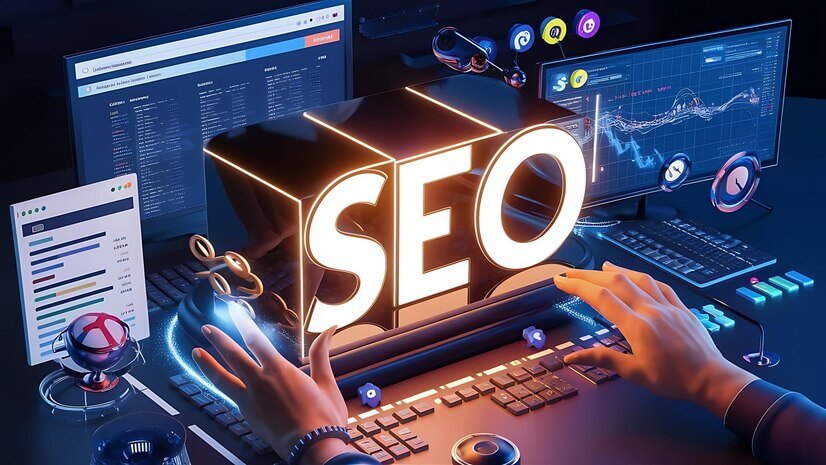Search Engine Optimization(SEO)
- In the digital age, where the internet is central to everything:
- Search Engine Optimization (SEO) has emerged as one of the most crucial aspects of online marketing.
- Understanding SEO is essential for enhancing your online presence.
- Reaching your target audience, whether you’re running:
- A small business
- A large corporation, or
- A personal blog,
What is SEO?

- Search Engine Optimization (SEO) refers to the process of improving a website’s visibility on search engines like:
- Bing
- Yahoo
- This visibility is achieved by:
- Enhancing the quality of content
- Using relevant keywords
- Making technical adjustments to the site
- The goal is to:
- Rank higher in the search results
- Attract more organic (non-paid) traffic
- At its core, SEO is about:
- Understanding what people are searching for online:
- The words? Or
- The phrases they use (keywords)?
- How search engines interpret these queries to:
- Deliver the best possible results.
Why is SEO Important?
- SEO plays a critical role in modern marketing strategies due to the following reasons:
Increased Visibility and Traffic
- Higher rankings on search engine result pages (SERPs) lead to greater visibility.
- Increasing the likelihood of attracting more traffic to your website.
- Most internet users don’t scroll beyond the first page.
- Making a top position essential.
Builds Credibility and Trust
- The Websites that appear on the first page of search results are often seen by users as more:
- Trustworthy
- Credible
- SEO enhances your authority in your niche.
- Positioning your brand as a reliable source of information or products.
Cost-Effective Marketing
- SEO offers a cost-effective way of generating traffic as compared to traditional advertising methods.
- Organic traffic from search engines is essentially “free,” .
- However, it requires an investment in SEO strategies.
Better User Experience
- SEO isn’t just about search engines; it’s about the user as well.
- When you optimize for SEO, you also create a better user experience.
- Factors that contribute to both SEO performance and user satisfaction include:
- website speedMobile Optimization
- Relevant content.
Competitive Edge
- SEO levels the playing field for small and medium-sized businesses.
- Even small businesses can compete with larger organizations with a well-executed SEO strategy,.
A Brief History and Evolution of SEO
- SEO has come a long way since its inception in the 1990s.
- It has evolved from a relatively simple process into a sophisticated and constantly changing digital marketing strategy.
1900 : The Early Days
- SEO began with the launch of the first search engines like:
- Yahoo
- AltaVista
- In these early days, SEO was largely focused on:
- Keyword stuffing
- Meta tags
- Submitting URLs to directories for indexing
- This era was simplistic.
- Primarily driven by keyword manipulation.
2000-2005: The Rise of Google
- The launch of Google in 1998 revolutionized the SEO landscape.
- Google’s algorithm emphasized:
- Content relevance
- Inbound links authority, It meant that SEO was no longer just about keywords but also about:
- Quality content
- Quality backlinks
- Google’s PageRank algorithm was groundbreaking.
- Making link-building an essential component of SEO.
2010-2015: Algorithm Updates and Penalties
- Google released major updates like:
- Panda (2011)
- Penguin (2012)
- Hummingbird (2013)
- It helped in combat black-hat SEO practices, including:
- Keyword stuffing
- Link schemes
- Poor-quality content
- These updates significantly impacted rankings, as the focus shifted to:
- High-quality
- User-friendly content
2015-2020: The Mobile Era and User Experience
- With the explosion of mobile internet users:
- SEO evolved to prioritize mobile optimization
- Google introduced the Mobile-First Indexing
- Websites optimized for mobile devices were given precedence
- The importance of user experience (UX) also came to the forefront, with:
- Page speed
- Navigation plays a key role in SEO success.
2020-Present: The AI Revolution
- Today, SEO is heavily influenced by:
- Artificial Intelligence
- Machine learning algorithms, such as:
- Google’s RankBrain
- These systems are better at:
- Understanding user intent
- Context, rather than just focusing on keywords
- Voice search
- Natural language processing
- Semantic search is now central to SEO strategies, as users interact more naturally with search engines.
Scope of SEO in the Current and Future Landscape
- As the digital world continues to expand, the scope of SEO grows with it.
- Here’s what to expect now and shortly:
- AI and Machine LearningVoice Search OptimizationVideo and Visual SEOMobile OptimizationLocal SEO.User Experience and Core Web Vitals
- Content Depth and Expertise
Conclusion: The Future of SEO
- Investing in SEO is not just about driving traffic only.
- It’s about building long-term visibility, credibility, and growth.
- The future of SEO will be dynamic:
- In future success will depend on understanding:
- Emerging technologies, and
- How they influence user behavior?
- Staying updated with the latest SEO practices will ensure your brand remains:
- Competitive
- Visible in the digital age







